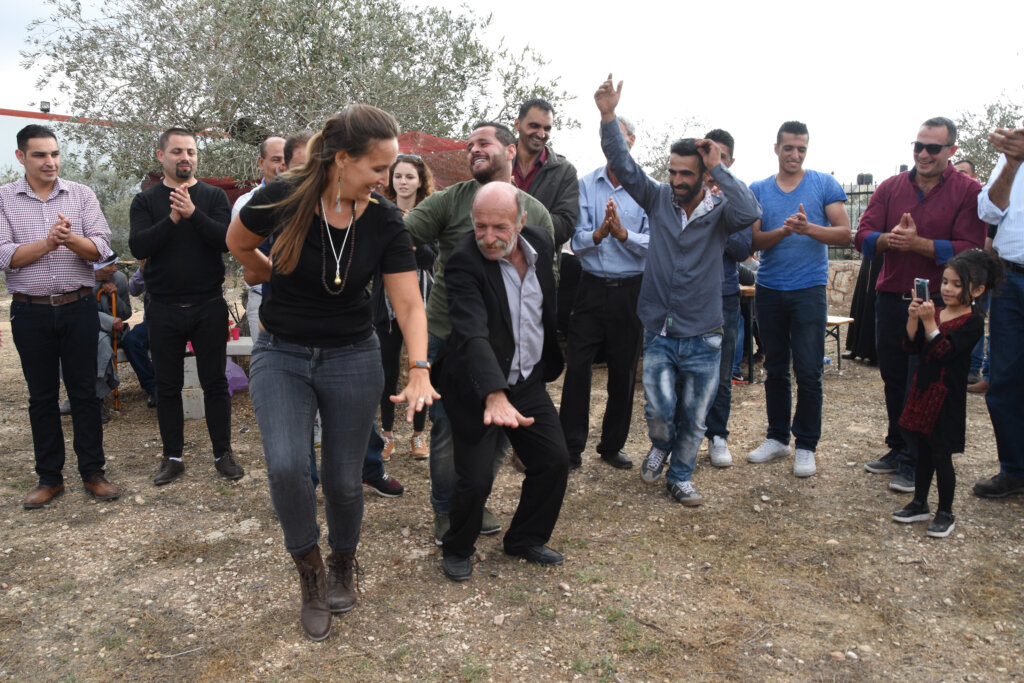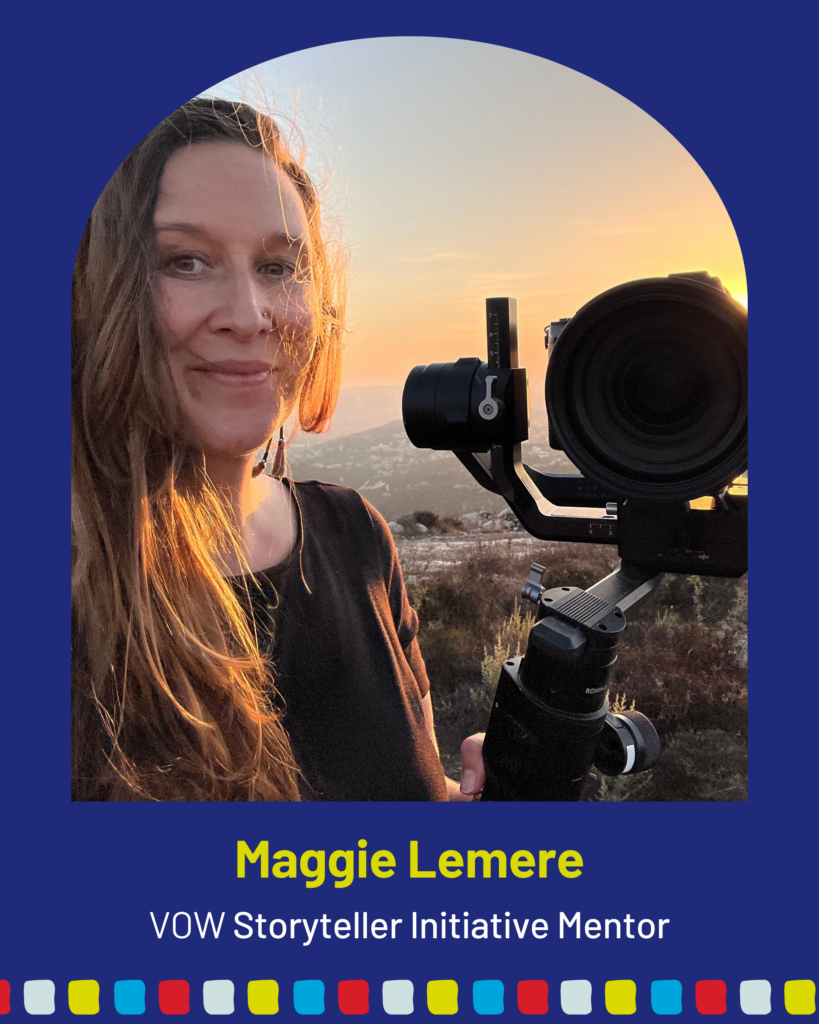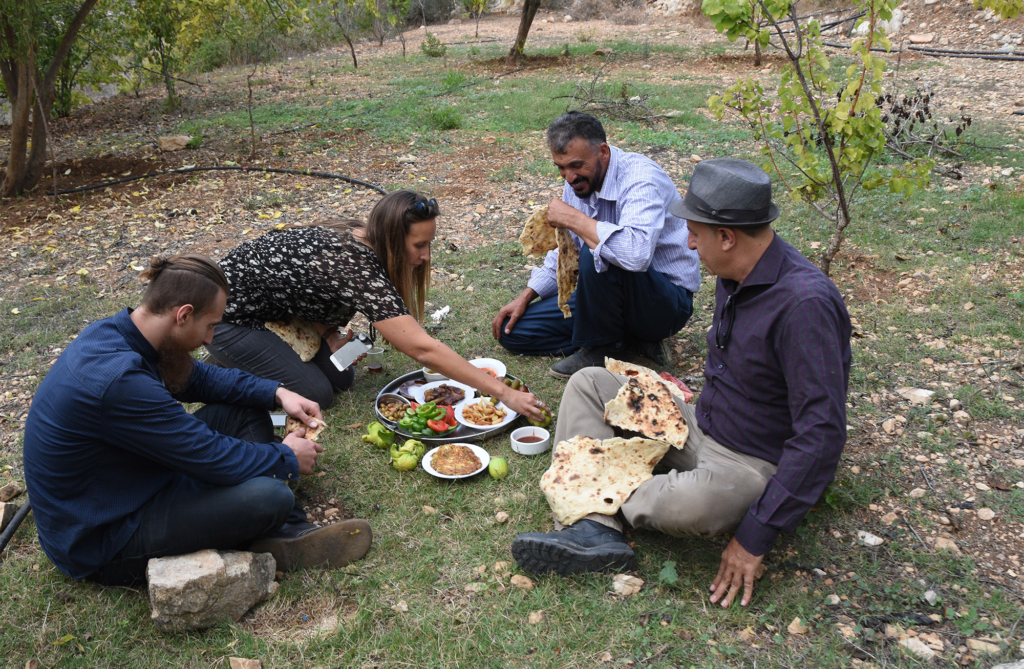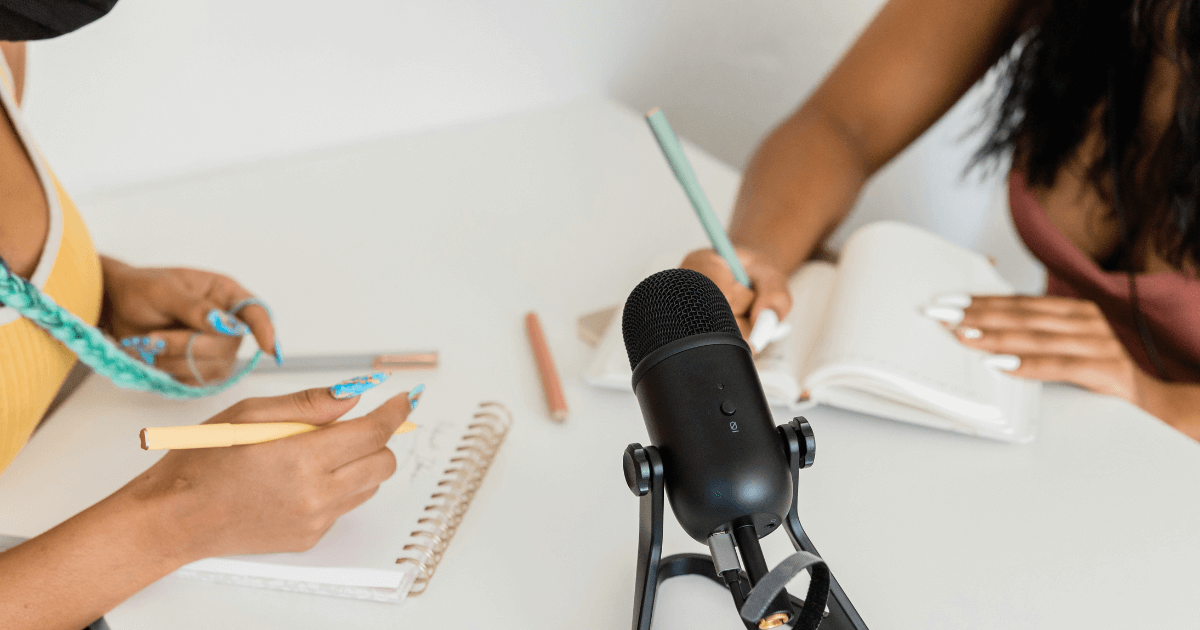By Claire Reisberg

Maggie Lemere dancing at an olive harvest festival with the olive farmer community in the Northern West Bank. Photo by Kris Herbst.
Maggie Lemere wants to know what you love about your home. For her, oral history is about creating “a more well-rounded sense” of someone’s life, which is intrinsically grounded in space and location. In our meandering interview, Maggie and I discussed her approach to oral history, her love of mentorship, and her belief in making place a character.
Maggie Lemere is an oral historian, filmmaker, storytelling strategist, and National Geographic Explorer. She is the co-founder of Rhiza, an environmental justice-focused, women-led storytelling collective, the co-editor of the VOW publication Nowhere to Be Home: Narratives from Burma’s Military Regime, and the lead oral historian for Stories as Science, with Tikkun Olam Productions and The University of Washington’s Climate Impacts Group. She is currently directing Land of Canaan, a National Geographic Society-supported feature film about Palestinians’ relationship with ancient olive trees, and Vs Goliath, a Patagonia-supported docuseries following frontline environmental leaders around the United States.
Maggie Lemere is also a mentor to Feini Yin, a journalist, fishmonger, and community organizer with Block Corporate Salmon, the North American Marine Alliance, and Fishadelphia. Feini is a fellow in VOW’s Storyteller Initiative, a program that provides support to storytellers from historically marginalized communities to help them develop and launch a creative project of their choosing grounded in oral history methods and ethical storytelling principles. Feini’s project, “In Our Wildest Salmon Dreams,” is a multimedia oral history and storytelling project spotlighting the fight for fisheries restoration and food sovereignty by BIPOC activists and Salmon Protectors.

Maggie, you have worked in so many different mediums, from film to podcasts to writing. Could you describe your career trajectory and how you ended up as an oral historian pursuing all these different projects?
I think I was always interested in oral history. When I was younger, I was obsessed with reading autobiographies. I was the classic nerd in high school who was involved in our TV studio, which we were really lucky to have at a public school. When I went to university, I was very torn between doing Media or doing International Relations. I ultimately went more into International Relations because I realized I wanted to have ideas to tell stories about, not just have the tools of telling stories.
When I eventually was living on the Thai-Myanmar border, working in support of the youth movement for human rights and democracy in Myanmar, I realized that I was doing a lot of work to help train the communities I was working with in how to do documentation and storytelling. At the same time, a lot of people from the outside were just getting very horrible images and stories and sweeping statistics and not really a lot of human-level, ground-level nuanced stories of people’s lives.
And so the opportunity came to work with Voice of Witness, and I jumped at it. I think we did something like 70 interviews for the book [Nowhere to Be Home], which only had 22 in the end. It was a huge undertaking, and the content of the book is also quite heavy. After finishing the book, I was a bit burned out. I didn’t love the editing part as much as I loved the production part. I felt like with documentary film, I could bring in a lot of oral history, but be the director, be the producer, be a camera person, and then collaborate with an editor who did that two year process of editing [into a film]. I love the visual medium, and I didn’t necessarily want to do another book.
I’ve always been primarily motivated by impact, and what I love about oral history is that it creates the most intentional form of connection with participants and the most possibility for learning and going in unexpected directions and reflections and meaning making. I really believe that if you’re able to hold a high quality process of story, reflection, and discovery, that can translate to many different platforms.
I’m a filmmaker that uses oral history as a foundation of my filmmaking practice.
I always look at oral history as my ethical foundation for any type of project that I’m doing. I let what the community needs and wants, drive what I do.
I try to bring in the ethics of oral history, but also the process of emergent storytelling, and trying to let go of my assumptions or need to have it all figured out at the beginning and allow the participants to help guide where the story will go. I’m especially trying to be cognizant of the power dynamics and relationships, and just the intense responsibility or experience of having your story portrayed on film. I think it’s even sometimes more profound than the written word because it’s every aspect of you.
How in your experience can oral history be used as a tool to challenge historical erasure and shed light on human rights abuses? Why is it important for people to understand the power of these oral histories?
With oral history and truth there are so many ways that any particular historical event is experienced and lived and remembered. For me in my work, even though it’s often about places and conflict, I’m really interested in why people love their home, what they want for their future, and a more well-rounded sense of their lives and their connection to place that typical human rights or news reporting can’t capture. And for me, that’s important because it’s about how we make meaning about the present moving into the future and how we center the voices of survivors in creating that future. I think oral history helps complicate our ideas and challenge them and puts us more in a position of listening and embracing complexity.
Even working on the Voice of Witness book, I heard a lot of survivors’ stories, and I realized that as important as it is to have testimony and to document violations of human rights and environmental rights, it can be extremely draining and extractive on the storytellers. And so I became really interested in finding a way to stay in the work that could honor that, but also go beyond that — through talking about love of place, through talking about dreams for the future, through making place a character, through making space for different forms of knowledge and resistance.
I try to think about, “How do I honor cultural knowledge keepers?” This is where I love film. It’s about not just the voices of the people, but the babbling brooks of Appalachia, the starry, beautiful nights in Palestine. Working on my feature film, set in the West Bank, has been one of the hardest things I’ve ever done. I didn’t realize when I started the film [Land of Canaan] what a historical document the film itself would become in the past two years because of the horrible escalation of violence in the communities where we filmed. So a lot of what we filmed has changed more than anyone had actually imagined.
Anytime I think back to harvest or fresh olive oil that I got to have several years in a row and dancing the dabke and all of that, all these really good experiences and all these friendships that I’ve made, it gives me so many levels of meaning to keep going. It’s the joy of the olive harvest and the sizzling tomatoes on the olive oil and bringing those things into a similar playing field as to what we typically get, which is the trauma and the conflict, because I think ultimately my theory is that connection to love is what’s going to keep people invested in these movements longer and sustain people in engagement.

Maggie Lemere enjoying the Palestinian Fair Trade Association and Canaan Fair Trade olive harvest season through a picnic in an olive grove. Photo by Kris Herbst.
What are your thoughts on mentorship? Specifically, how is your mentorship going with Feini Yin? Is there any advice you give as a mentor to aspiring filmmakers and storytellers?
When I was asked to be a mentor for Feini, it was such a full circle moment with Voice of Witness. Voice of Witness was the organization that gave me my break, that helped me really see myself as a storyteller, which is something I knew I was and that I wanted to be, but when you have an organization that believes in your voice, your ethics, your values, and your process, and helps mentor you to create something, that was an incredible inflection point.
I love mentorship because I get to be in the place of helping people feel creatively liberated and just reassuring them that it’s okay to take those risks. I think the most important thing for my career has been the willingness to take risks, to not have a nine to five job, to get so much rejection along the way, but to care so much about what I was doing and who I was working with, that it was worth it to me. And so I think normalizing that rejection, normalizing not knowing what you’re doing, having someone to bounce ideas off with and deepen them, is a big part of the learning.
I always like to say it’s not about having the greatest equipment or the highest production value. It’s about having the most authentic and interesting thing to say or just doing the thing. Because you look at movements today, it’s not these multimillion dollar Hollywood movies that are making an impact. It’s often people sharing real authentic stories that break through the noise of all of the incredible amount of content that’s out there that actually gets a human reaction. So at the end of the day, storytelling is really just about sharing energy and authenticity. I think you need passion, access to ideas and stories, and a lot of tenacity.
Because this path requires a lot of tenacity, there has to be something that holds you into it. So whether you’re doing an oral history project or making a film, you’re in relationship for the rest of your life to that project and to the people who are part of it. So try to be real with yourself about what those stories, what those places, what those issues are, because it is a long term relationship and a never ending responsibility.
When I was younger, I was really motivated by injustice, and that’s still certainly a core, but I don’t think that that can keep your flame. I needed love and connection to people, to communities, to place, to be so foundational that it could just support me and others in the work. Make space for joy and connection within the work, because that is ultimately going to help you get through the harder times.
Learn more about VOW’s Storyteller Initiative here and support the fellowship with a donation here.
Claire Reisberg is a student at Haverford College pursuing a major in English with minors in Comparative Literature and Growth and Structure of Cities and a concentration is Peace, Justice, and Human Rights. She is the summer intern at Voice of Witness where she has been thrilled to learn more about the world of oral history and support the VOW Editorial, Education, and Development departments.




